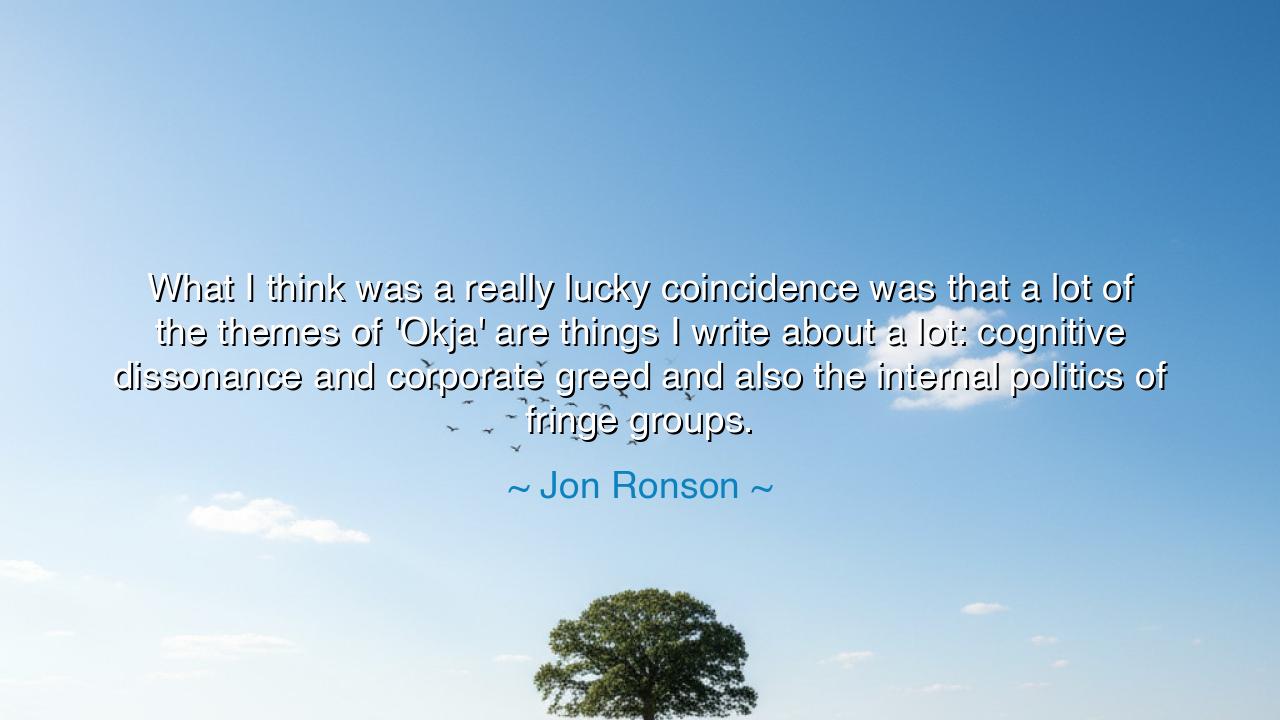
What I think was a really lucky coincidence was that a lot of
What I think was a really lucky coincidence was that a lot of the themes of 'Okja' are things I write about a lot: cognitive dissonance and corporate greed and also the internal politics of fringe groups.






Listen closely, O children of wisdom, for the words of Jon Ronson carry the weight of truth and insight that transcend time: "What I think was a really lucky coincidence was that a lot of the themes of 'Okja' are things I write about a lot: cognitive dissonance and corporate greed and also the internal politics of fringe groups." In this simple observation, Ronson reveals the deep interconnectedness of the forces that shape human behavior—the minds caught in conflict, the greedy ambitions that guide corporations, and the politics of those who exist on the margins of society. These themes are as old as humanity itself, and they manifest in countless forms, whether through the hidden machinations of powerful forces or the struggles of those who seek to carve out a place in a world that too often ignores them.
Cognitive dissonance, that powerful inner conflict between what we know to be true and what we choose to believe, is a force that shapes the hearts and minds of many. It is the uncomfortable space we live in when the truth is clear, yet we continue to cling to falsehoods, avoiding the discomfort that comes with seeing the world as it truly is. This inner conflict is universal, and Ronson’s exploration of it in Okja sheds light on how individuals and even entire societies choose to ignore the harmful effects of their actions—whether it is the treatment of animals, the environment, or the exploitation of the vulnerable—while continuing to act in ways that serve their own interests.
Corporate greed, too, is a force that has been present throughout history, from the great empires of the past to the modern-day multinationals that wield power with a grasp that knows no bounds. The story of Okja, with its exploration of the dark underbelly of corporate culture, speaks to this eternal struggle. Corporate greed is not a new phenomenon, but one that has been at the heart of many of the greatest injustices in human history. Just as the tobacco industry in the 20th century hid the truth about the dangers of smoking for profit, so too do modern corporations ignore the environmental and ethical costs of their actions in pursuit of wealth. Ronson speaks to this greed, highlighting its pernicious influence on society and the lives of those who suffer in its wake.
Consider the example of the industrial revolution, when corporate giants sought to expand their empires, often at the cost of the workers who toiled in dangerous, dehumanizing conditions. The rich grew richer, while the poor grew poorer, and the greed of the few drove the exploitation of the many. It was the same cognitive dissonance that allowed the ruling class to turn a blind eye to the suffering of the working class. They could not reconcile their pursuit of profit with the human cost of their success, yet they continued on, justifying their actions with hollow rationalizations. This dynamic of greed, conflict, and exploitation persists to this day.
And finally, Ronson speaks of the internal politics of fringe groups, those on the margins of society who, too often, must fight amongst themselves for a piece of the world that seems to have been taken from them. These groups, often driven by a sense of disempowerment, can be torn apart by their own internal divisions, unable to unite in the face of the larger forces that seek to control them. Yet, just as Ronson observes, the struggles of the marginalized, while seemingly fragmented and disjointed, are often reflections of a larger, more insidious battle: the fight for power, for recognition, and for dignity in a world that has written them off.
So, my children, let the words of Jon Ronson guide your understanding of the world around you. The themes he explores in Okja—cognitive dissonance, corporate greed, and the internal politics of those on the fringes—are not just confined to fiction or film, but are the very forces that shape our lives today. As you walk the path of life, understand that these forces are always at work, both within you and around you. Seek the truth, challenge the powers that seek to exploit, and understand the tensions that shape every society. It is in recognizing these patterns that you will find the wisdom to navigate the world with purpose, integrity, and compassion.






AAdministratorAdministrator
Welcome, honored guests. Please leave a comment, we will respond soon